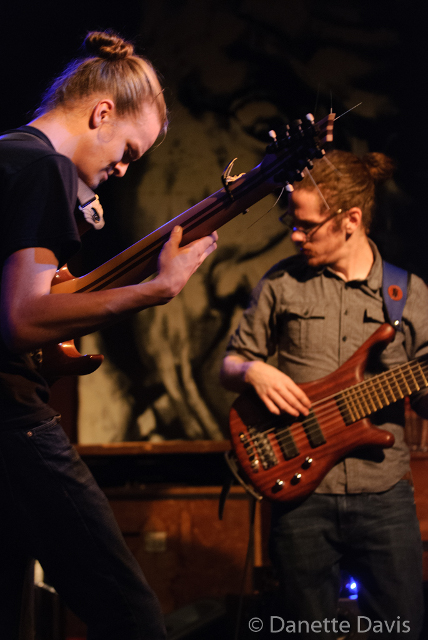
Exposé Online
What's old
Exposé print issues (1993-2011)
- 1 (October 1993)
- 2 (February 1994)
- 3 (May 1994)
- 4 (August 1994)
- 5 (October 1994)
- 6 (March 1995)
- 7 (July 1995)
- 8 (November 1995)
- 9 (March 1996)
- 10 (August 1996)
- 11 (February 1997)
- 12 (May 1997)
- 13 (October 1997)
- 14 (February 1998)
- 15 (July 1998)
- 16 (January 1999)
- 17 (April 1999)
- 18 (November 1999)
- 19 (May 2000)
- 20 (October 2000)
- 21 (March 2001)
- 22 (July 2001)
- 23 (December 2001)
- 24 (April 2002)
- 25 (September 2002)
- 26 (February 2003)
- 27 (August 2003)
- 28 (December 2003)
- 29 (April 2004)
- 30 (September 2004)
- 31 (March 2005)
- 32 (September 2005)
- 33 (May 2006)
- 34 (March 2007)
- 35 (January 2008)
- 36 (October 2008)
- 37 (July 2009)
- 38 (July 2010)
- 39 (Summer 2011)
Features
Raiding the Magic Satchel —
Seaprog 2015 in Review

After a nearly 22 hour road trip from Utah complete with a night-time detour through the dense forest of central Oregon, the pillow against my face in our Seattle hotel room never felt so good – I think I was sound asleep in about 30 seconds, if even that long. In the haze of fatigue a full day disappeared and suddenly it was mid-day Friday and a beautiful day in Seattle, I was completely refreshed. It was the long anticipated journey to the next Seaprog that drew me here, especially after having had such a blast at last year’s event.
by Peter Thelen, Published 2015-09-24
photography by Danette Davis
Friday – Day Zero
This time I was accompanied by my wife, whose interest was piqued originally by the inclusion of the Indonesian band I Know You Well Miss Clara (sadly, they ultimately cancelled), and we would meet our daughter in Seattle also, who was there for an entirely different reason, but joined us for the first night of music at The Royal Room in Columbia City, a small club a few doors away from the main venue, that traditionally hosts the Friday night event. After a great dinner at Island Soul, a Haitian restaurant about a block away, we were settled in the Royal Room, ready for the first act of the weekend.
First to hit the stage were Isthmusia – three young guys from Kingston, Washington, out on the Kitsap peninsula. Eight string guitar, six string bass, a coffin full of effects pedals, and drums, offering a cauldron of complex math rock, impressive tapping techniques, and a driving groove, all delivered at ear-splitting volume. Once the ear plugs went in, this trio was a lot easier to appreciate. Their all-instrumental set offered some lighter moments mixed in with the heavy driving complexity, in all a good balance of sound, and lasted just shy of one hour. I have to say a mighty impressive hour for a band that I suspect most in the audience were completely unfamiliar with.
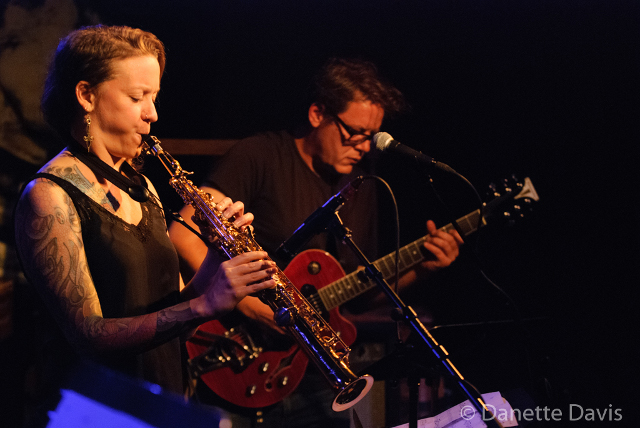 The second act to hit the stage on Friday was a complete about-face from the first. Northern Cantrips is a Seattle based jazz quintet led by guitarist Simon Henneman, flanked by vibraphonist Bob Rees and soprano saxophonist Kate Olson, with the rhythm section of John Seman (double bass) and Evan Woodle (drums). The vibraphone took up half the stage, but Rees opened the first cut using piano on a sparkling composition that seemed to be as much an improvisation, wandering the world of jazz idioms. From their second cut onwards, their set was highlighted by conversations between vibraphone, sax, and wailing over-the-top guitar solos, accentuated by a mix of standard drum kit and electronic percussion with the double bass growling up from the bottom, offering something akin to an update on classic bebop, tango, and occasional excursions into Brazilian jazz styles – their closer being an interpretation of a Hermeto Pascoal piece. I was told this was only the band’s second live gig; an amazing set, any way you look at it.
The second act to hit the stage on Friday was a complete about-face from the first. Northern Cantrips is a Seattle based jazz quintet led by guitarist Simon Henneman, flanked by vibraphonist Bob Rees and soprano saxophonist Kate Olson, with the rhythm section of John Seman (double bass) and Evan Woodle (drums). The vibraphone took up half the stage, but Rees opened the first cut using piano on a sparkling composition that seemed to be as much an improvisation, wandering the world of jazz idioms. From their second cut onwards, their set was highlighted by conversations between vibraphone, sax, and wailing over-the-top guitar solos, accentuated by a mix of standard drum kit and electronic percussion with the double bass growling up from the bottom, offering something akin to an update on classic bebop, tango, and occasional excursions into Brazilian jazz styles – their closer being an interpretation of a Hermeto Pascoal piece. I was told this was only the band’s second live gig; an amazing set, any way you look at it.
 So in a little over two hours we’ve gone from edgy, effected math rock to a reinterpretation of classic be-bop and improvisational jazz… so where to next? Put the ear plugs back in. We’re in for another loud ride with Panther Attack! Their explorative instrumental style pushes outward in all directions, driving hard yet providing plenty of variation in their multifaceted style. A four piece of two guitars (right and left handed, the left handed player appeared to be using a normally strung right-handed guitar inverted, and occasionally he’s doubling as a second drummer as well), electric bass, and drums, with a sax player joining the crew on their last two pieces. Their pieces are too tight to not be composed, yet evolve as they go much like improvisations; this is a band that’s going its own direction, and difficult to draw any convenient comparisons to. Their sound could grow loud and unruly, then just as easily pull back and ease into a more introspective or technical direction. All the players are outstanding, one can easily tell that they have played together extensively and developed a somewhat telepathic element in their style, their strength as musicians lies is in what they do together, and not so much individually as players. With surprises at every turn as they proceeded through their set, all taken a great way to top off the first night of the festival.
So in a little over two hours we’ve gone from edgy, effected math rock to a reinterpretation of classic be-bop and improvisational jazz… so where to next? Put the ear plugs back in. We’re in for another loud ride with Panther Attack! Their explorative instrumental style pushes outward in all directions, driving hard yet providing plenty of variation in their multifaceted style. A four piece of two guitars (right and left handed, the left handed player appeared to be using a normally strung right-handed guitar inverted, and occasionally he’s doubling as a second drummer as well), electric bass, and drums, with a sax player joining the crew on their last two pieces. Their pieces are too tight to not be composed, yet evolve as they go much like improvisations; this is a band that’s going its own direction, and difficult to draw any convenient comparisons to. Their sound could grow loud and unruly, then just as easily pull back and ease into a more introspective or technical direction. All the players are outstanding, one can easily tell that they have played together extensively and developed a somewhat telepathic element in their style, their strength as musicians lies is in what they do together, and not so much individually as players. With surprises at every turn as they proceeded through their set, all taken a great way to top off the first night of the festival.
Saturday – Day One
Saturday; morning I think. One thing you cannot count on in the heart of Columbia City is parking. Arrive early, and spend a bunch of time driving in circles or figure 8’s until somebody moves and you can grab their spot. We arrived plenty early and got super lucky, finding a spot just a little over a block away, down the hill and around the corner, though not without a three hour limit. A full hour before the theater even opened their doors. How to kill an hour? The little bistro right next door serves great stuff, so we found ourselves sampling espressos, crepes and pizza from their menu out in the open air seating on the sidewalk, watching people come and go. Hey, there’s a face I recognize – It’s Dennis Rea, one of the festival’s organizers, and he’s entering the theater, so it’s probably time to pay our tab and start scootin’.

First up was General Mojo’s, one of the acts at this festival that I was familiar with going in, having reviewed their CD General Mojo’s Key Project earlier this year on the site. The band was pretty much the same people, only the original female singer (Tekla Waterfield) has now been replaced by singer and keyboardist Kate Copeland, but for this show another singer, Melissa Montalto, was covering for Copeland, who couldn’t make the show. The opening part of their set pretty much mirrors the opening of the album, culminating with the infectious “Maria! Maria!” Indeed, like that Key Project CD, which is already a couple years old, the remainder of their set drew some from that as well as adding a whole bunch of new tunes that presumably be included on their next recording – an EP to come was mentioned several times during their set. Seattle homegrowns, the band is a five-piece, also featuring bass, guitar, drums, horns, and keyboards, although for the first half of their set, there were no female vocals, the guys sang all the tunes that needed singing. No less eclectic, their style is still a little bit of everything, original tunes drawing ideas from all over the musical map, some with vocals and some without. A very good impression taken away from their performance.
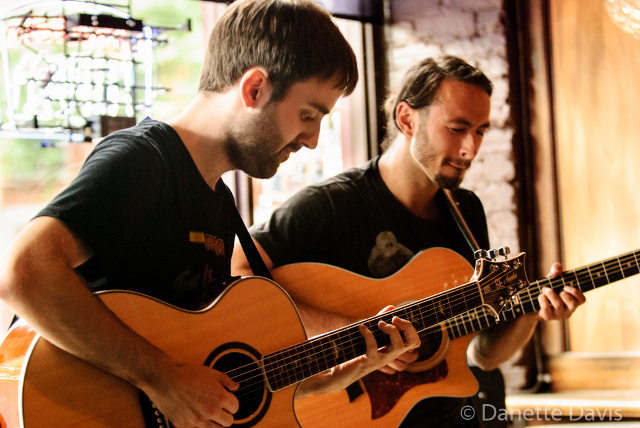
That three-hour parking limit reared its ugly head, and having to move the car caused me to miss part of the next group who played in the front room while the main stage was being set up for the next band. Plus or Minus is a mostly acoustic duo featuring two guitarists, Tony Dunlap and Josh Brugman. Brugman also sings on some of the tunes, though some are instrumental; Dunlap does break out the electric occasionally for a change of pace. With just the two of them, tight interaction is the main order of business, and while their music isn’t blatantly proggy, attentive listeners will notice some odd meters, and they stray from standard pop / rock song structures. They were very entertaining and the crowd was very appreciative. They apparently haven’t been into a studio yet - there are some live videos online, but not CD available.
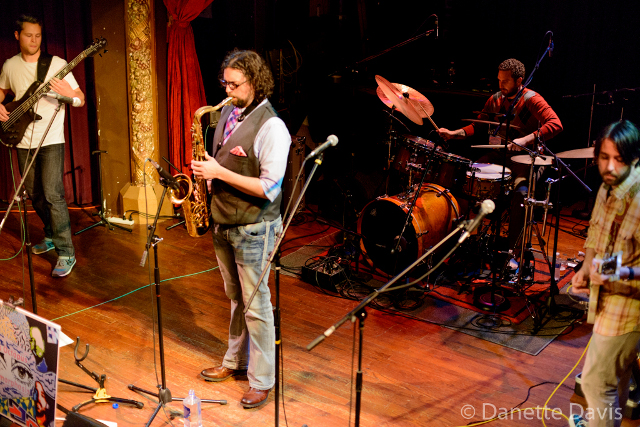 Pink Octopus was up next in the theater, a band I was unfamiliar with, and hadn’t spent a lot of cycles investigating before the performance. This Seattle based quartet of guitar, drums, saxes and bass, mostly without vocals (some effected spoken voice parts early on) seems to be driven by guitarist Jonathan Louis Huffman. My first impression is that this was sort of in the early 70s King Crimson vein (maybe Islands era due to the sax), a hard, edgy and complex sound that wanders through odd meter territory, heavy grooving, with bits of math and jazz in the mix for a potent rock sound that pushes a lot of proggy buttons. After a few tunes a bit more funk grooves started appearing in their sound, pushed hard from the bottom end by bassist Luke Wyman and drummer Ian McCarley, with the grit and and rough edges coming from Huffman and saxophonist Michael Porenta. Apparently the band had just released a new album the previous week, but sadly neglected to bring any product to sell at the show. That said, the hard funk sound that propelled most of their set was sweet groove candy to my ears, and it seemed to end too soon; I could have easily sat – or danced around, to another hour of what they had on offer.
Pink Octopus was up next in the theater, a band I was unfamiliar with, and hadn’t spent a lot of cycles investigating before the performance. This Seattle based quartet of guitar, drums, saxes and bass, mostly without vocals (some effected spoken voice parts early on) seems to be driven by guitarist Jonathan Louis Huffman. My first impression is that this was sort of in the early 70s King Crimson vein (maybe Islands era due to the sax), a hard, edgy and complex sound that wanders through odd meter territory, heavy grooving, with bits of math and jazz in the mix for a potent rock sound that pushes a lot of proggy buttons. After a few tunes a bit more funk grooves started appearing in their sound, pushed hard from the bottom end by bassist Luke Wyman and drummer Ian McCarley, with the grit and and rough edges coming from Huffman and saxophonist Michael Porenta. Apparently the band had just released a new album the previous week, but sadly neglected to bring any product to sell at the show. That said, the hard funk sound that propelled most of their set was sweet groove candy to my ears, and it seemed to end too soon; I could have easily sat – or danced around, to another hour of what they had on offer.
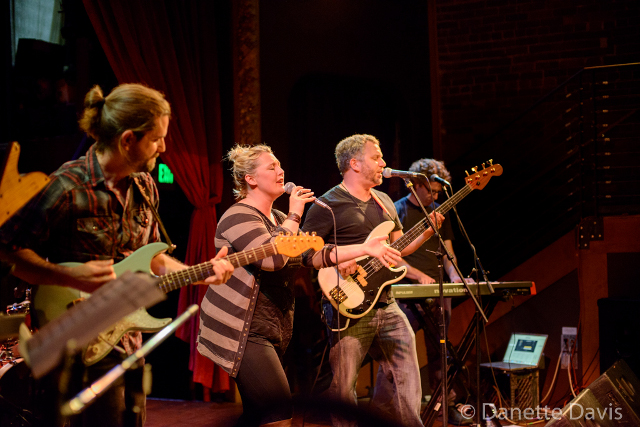 After a quick dinner break, the time had come for MoeTar to take the stage, their first time ever in Seattle. The band is from the San Francisco Bay Area, a six-piece of drums, bass, guitars, two keyboards, and a powerful female voice in singer Moorea Dickason. Yeah, I had heard their two albums (both highly recommended) but those sure didn’t prepare me for the intensity of their live show, which just just left me floored. This is really a hard band to describe, their sound is clearly heavy but not hard, constantly playing with odd time, jumps and skips in the middle of a measure, making it a challenge to tap your foot to – much in the way that Happy the Man or Gentle Giant did back in the day, shifting keys in the middle of a song, all the while blasting it wide open with some of the most amazing vocals of the entire festival. Somehow amid all that challeging complexity, they are able to make music that is at once accessible, colorful, and muscular. One thing that is always a challenge is what to focus on within their complex fabric of sounds; one’s attention may be pulled away from the complex instrumental interplay for a few measures by the vocals, only to be thrown right back into it as everything comes back together. The audience was blown away, and demanded an encore. I don’t think anyone walked out of the theater after their set unmoved.
After a quick dinner break, the time had come for MoeTar to take the stage, their first time ever in Seattle. The band is from the San Francisco Bay Area, a six-piece of drums, bass, guitars, two keyboards, and a powerful female voice in singer Moorea Dickason. Yeah, I had heard their two albums (both highly recommended) but those sure didn’t prepare me for the intensity of their live show, which just just left me floored. This is really a hard band to describe, their sound is clearly heavy but not hard, constantly playing with odd time, jumps and skips in the middle of a measure, making it a challenge to tap your foot to – much in the way that Happy the Man or Gentle Giant did back in the day, shifting keys in the middle of a song, all the while blasting it wide open with some of the most amazing vocals of the entire festival. Somehow amid all that challeging complexity, they are able to make music that is at once accessible, colorful, and muscular. One thing that is always a challenge is what to focus on within their complex fabric of sounds; one’s attention may be pulled away from the complex instrumental interplay for a few measures by the vocals, only to be thrown right back into it as everything comes back together. The audience was blown away, and demanded an encore. I don’t think anyone walked out of the theater after their set unmoved.
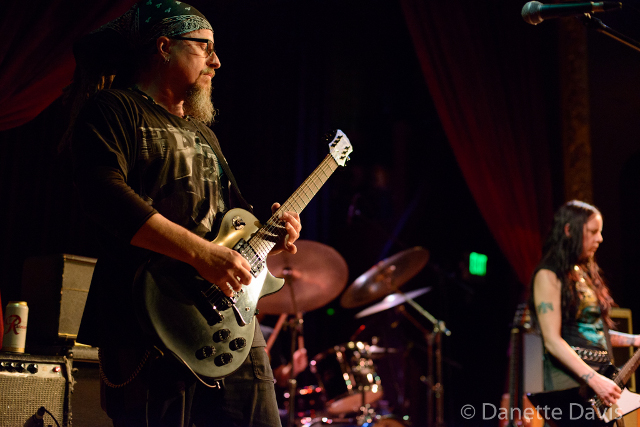
Upwell is a Seattle band that I was completely unfamiliar with, but they had a lot of product for sale; I think I had four of their discs in my backpack before their set even started. That could be a lesson for the future – don’t go all out until you’ve heard the band play. The main focal point of the quartet is singer and guitarist Michelle Pavcovich, who does an admirable job, accompanied by a guitarist, drummer, and a bassist who is also the band’s producer. I realized there might be a problem when the band was providing free ear plugs on the way into the theater. Uh-oh. That’s nice of them, but why not just turn down the amps a little? Their style could best be described as a full volume collision between arty punk and metal with a lot of attitude in tow. Everything was sufficiently muffled through the courtesy ear plugs, sort of like listening through a dense foam pillow, so there wasn’t a lot of pain. One thing Pavcovich delivers with her singing is an abundance of emotion, never mind that it’s difficult to understand much, if any, of what she’s singing, the emotion does come through it all. While their style is really not my thing, I can appreciate their superbly dynamic performance, and it worked well as an end to Saturday’s musical proceedings.
Sunday – Day Two
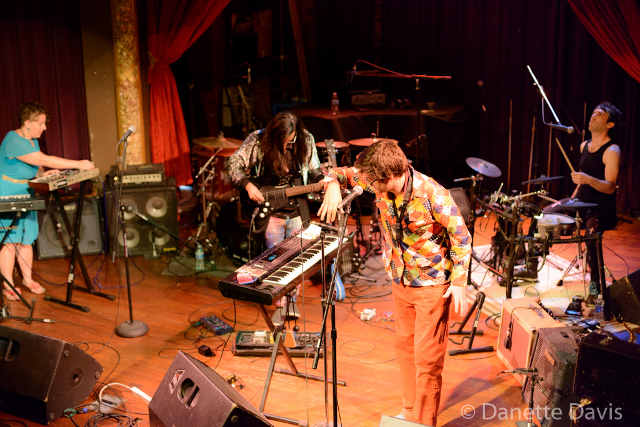
Johnny Unicorn and his Jam Unit was first up on Sunday, one of the artists I was familiar with going in, having reviewed three of his releases previously. Unicorn, a veteran of Seaprog 2014 as the bassist with Autumn Electric, had a very different presentation on offer here, starting with his 20+ minute prog-excercize piece “Companionship,” a very mechanical sounding and repetitive number featuring drums, drum machines, keyboards, guitar solos, and Johnny running in place with his sax, offering some vocals off and on as needed. The constant thump thump thump got a little tiresmome after a while, but ended suddenly just before it became unbearable. His “Jam Unit” features keyboardist Naomi Adele Smith and drummer / guitarist Chris Barrios, both also members of Autumn Electric, along with drummer / bassist Jesse Mercury and guest singer Adriana Tapia who joined for the final number. Each of the two remaining numbers ("Angels" from his newest release and the title suite from the Sweet Edith Manton album) pushed the twenty-minute mark, and both were far more engaging pieces than his opener, making for an hour-long set of interesting sounds from all over his uniquely tweaked musical universe.
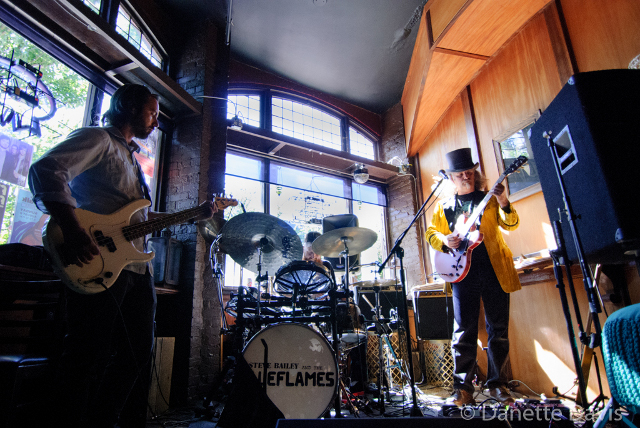 Outside the theater in the front room and bar, Seattle based trio Nosretep was already set up and ready to start their set. What a strange name for a band, you might ask, until you realize it’s just monster drummer Mike Peterson’s name spelled backwards; the band is rounded out by bassist Andy Sells and, last but not least, guitarist Igor Abuladze. These guys were loud, nearly all instrumental (excepting some very interesting pre-recorded taped stuff that fit into their sound nicely on occasion), and all three were exceptional players – ‘chops’ being the keyword here, which they proved over and over again throughout their set which lasted just shy of an hour. Unless one is lucky enough to snag one of the dozen-or so bar stools up in that front room area of the bar, it’s standing room only, and so I did, mesmerized by their power. Their material is sort of a hybrid of math-rock, jazz, and metal, constantly flexing and shifting meter, with strong hints of guitar-craft from both guitar and bass, and some hard funky grooves. When these guys start mega-shredding it’s almost like the world is gonna end, but it’s a nice way to conclude a song too. They did perform some material that was a little less edgy as well, but it generally morphs into something harder and grittier before the piece concludes, leaving the listener speechless. Fans of the Cuneiform hard-edged jazz-rock ethic will find plenty here to get excited about. I certainly could have listened to this trio for another hour easily, but there were other surprises in store for the day.
Outside the theater in the front room and bar, Seattle based trio Nosretep was already set up and ready to start their set. What a strange name for a band, you might ask, until you realize it’s just monster drummer Mike Peterson’s name spelled backwards; the band is rounded out by bassist Andy Sells and, last but not least, guitarist Igor Abuladze. These guys were loud, nearly all instrumental (excepting some very interesting pre-recorded taped stuff that fit into their sound nicely on occasion), and all three were exceptional players – ‘chops’ being the keyword here, which they proved over and over again throughout their set which lasted just shy of an hour. Unless one is lucky enough to snag one of the dozen-or so bar stools up in that front room area of the bar, it’s standing room only, and so I did, mesmerized by their power. Their material is sort of a hybrid of math-rock, jazz, and metal, constantly flexing and shifting meter, with strong hints of guitar-craft from both guitar and bass, and some hard funky grooves. When these guys start mega-shredding it’s almost like the world is gonna end, but it’s a nice way to conclude a song too. They did perform some material that was a little less edgy as well, but it generally morphs into something harder and grittier before the piece concludes, leaving the listener speechless. Fans of the Cuneiform hard-edged jazz-rock ethic will find plenty here to get excited about. I certainly could have listened to this trio for another hour easily, but there were other surprises in store for the day.
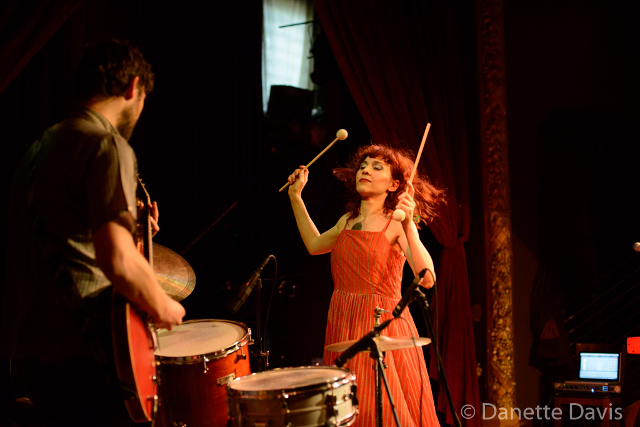 Next up on the main stage in the theater was one of the most unusual performances of the weekend and one that I’m sure few in the audience will forget. Debora Petrina is an Italian composer, singer and multi-instrumentalist with a varied carreer spanning art-rock, pop, classical, and much more, and it was all delivered to Seattle on Sunday afternoon. Beginning with a solo piece on a grand piano near the rear of the stage, it was quickly morphed into into an experimental looped and delayed guitar piece by the only other musician on stage, Mirko di Cataldo (who supplied guitars, drums, percussion and other effects throughout Petrina’s set) with Petrina lying on the floor of the stage delivering vocals through an echo device. Shortly after, and seamlessly with the ongoing guitar loop previously initiated, she took to the electronic keyboard at the front of the stage facing the audience, singing her next number with a number of effects swirling around the room. The audience was stunned.
Next up on the main stage in the theater was one of the most unusual performances of the weekend and one that I’m sure few in the audience will forget. Debora Petrina is an Italian composer, singer and multi-instrumentalist with a varied carreer spanning art-rock, pop, classical, and much more, and it was all delivered to Seattle on Sunday afternoon. Beginning with a solo piece on a grand piano near the rear of the stage, it was quickly morphed into into an experimental looped and delayed guitar piece by the only other musician on stage, Mirko di Cataldo (who supplied guitars, drums, percussion and other effects throughout Petrina’s set) with Petrina lying on the floor of the stage delivering vocals through an echo device. Shortly after, and seamlessly with the ongoing guitar loop previously initiated, she took to the electronic keyboard at the front of the stage facing the audience, singing her next number with a number of effects swirling around the room. The audience was stunned.
Petrina intoduced Mirko “...that rhymes with miracle,” and proceeded with a tale of lost luggage on their way from Italy to a previous performance in San Francisco, and how it all miraculously showed up in Seattle. They then launched into the next piece “Princess of the Mountains” with a short back-story on the song. Following that, the audience was completely won over, and still stunned! The set continued, this time with another vocal piece, using a harmonizer and looper to produce eerie effects while the guitarist interjected some snarly riffage and eventually some drums and keyboards on top of that. Of course, with all the effects and loops in play throughout the set it was not without some intermittent technical issues that the two managed to work through gracefully. For many the highlight of the set may well be the eerily haunting piece “Roses of the Day” she composed based on John Cage’s “Experiences No.2,” featured as the title track of her latest album, featureing voice and piano. But what the Seattle audience got to hear was an unrecorded alternate version featuring voice, guitar, delays, and loops. At another point in the set 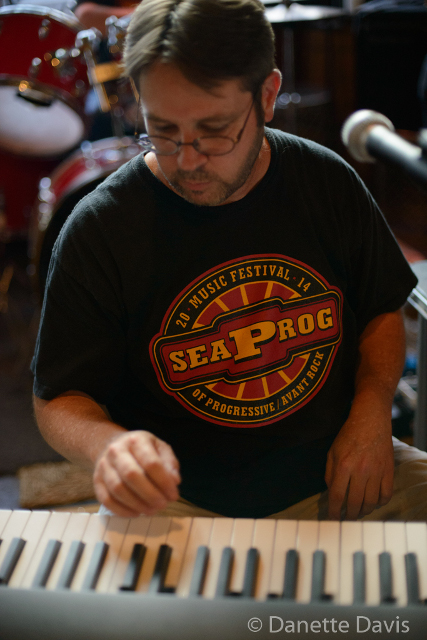 she retreated to the grand piano where she prepared some of the strings with various things to give it an unusual character, almost like a toy piano, which she played along with while she sang, with Mirko adding some bass parts and later drums. All taken, this was clearly one of the most unusual and satisfying performances that I’ve experienced in recent memory, being completely spellbound from beginning to end.
she retreated to the grand piano where she prepared some of the strings with various things to give it an unusual character, almost like a toy piano, which she played along with while she sang, with Mirko adding some bass parts and later drums. All taken, this was clearly one of the most unusual and satisfying performances that I’ve experienced in recent memory, being completely spellbound from beginning to end.
Back to the front room after a short break, Magick Pogoda had already started their performance, a four-piece featuring John Reagan, one of the festival’s organizers, on the drum kit. But the main force behind the quarted seemed to be sound engineer Christian Heilman, playing a whole table full of keypads, mixers, effects, and stuff like that, “painting” on top of the improvisations that the other three players were creating, which also included Carl Germain on guitar and Steve Turnidge on bass, the latter an especially vital component of their sound. Their style is clearly in a prog vein, with touches of jazz, psych, and funk in the mix. Like a lot of improvisational units, these are sort-of semi-composed and certainly well rehearsed pieces, often growing and evolving on the spot, keeping a steady pace; but these players have the good sense to end a piece suddenly as soon as the magick wanes. There are some voices in the mix at times also, mostly shouts and occasional spoken parts that sounded as improvised as the music in progress at that moment. They closed their short set (maybe half an hour) with the closing “Würm” section of Yes’ “Starship Trooper” which was particularly well received.
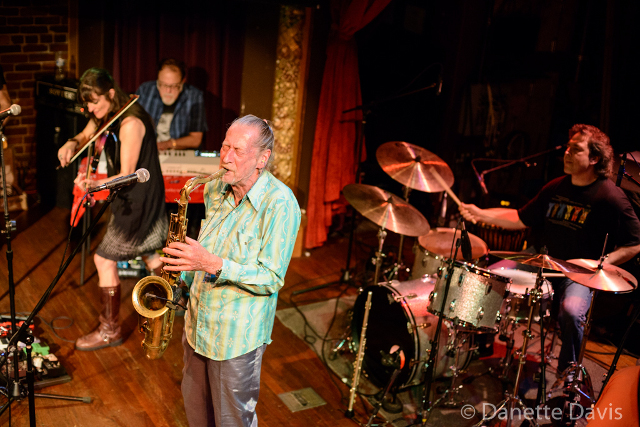
The final set of the weekend was no less than the Mighty Thunder Rider Nik Turner, one of the founding fathers of psychedelic space rock as a founder-member of Hawkwind, playing saxes, flute, and singing on all those classic albums we know and love, as well as his later bands Space Ritual, Sphynx, Space Fusion Odyssey, and Inner City Unit; material culled from all of these bands and projects would be played during this mammoth 100 minute set. He was accompanied by Flame Tree, a collective of Seattle-area musicians formed by drummer Jack Gold-Molina (of Spectral Waves) and guitarist Dennis Rea (of Moraine) several years ago; also in the band are guitarist and producer Jack Endino, Mellotronist Steve Fisk, synthesist Ffej, violinist Alicia DeJoie (also of Moraine), and bassist Paul Kemmish. This night’s performance was the culmination of a couple weeks of rehearsals together.
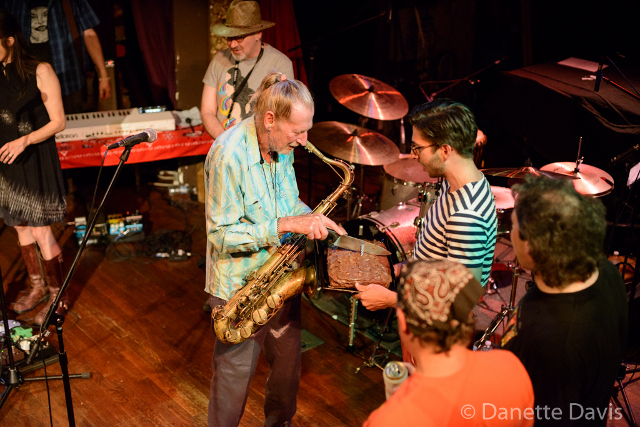
Nick was in fine form, as he always tends to be, full of energy and magic. Three tunes in, he performed the title cut from the Space Ritual album Otherworld, following “Watching the Grass Grow” from the debut Inner City Unit LP. Most of the Hawkwind material performed throughout his set seemed to be from around the Space Ritual period. The audience was completely spellbound, the thick wall of sound emanating from the stage end of the hall was hypnotic and filled with force, the band serving Nik very well. A high point for me came when Turner performed the lengthy flute piece “Anubis,” from his album with Sphynx, Xitintoday, a very mellow and magical piece based on material he originally recorded inside the great pyramid of Giza in 1976, but not released until the 90s when he re-recorded the Sphinx album. Slowly the mellow mood would pick up and transform the set back into high energy space rock, as he pulled more Hawkwind and Space Ritual classics out of his magic satchel.
Following a generous encore and an update on Nik’s current endeavors (including his Hawkwind autobiography), perhaps only a few informed people in the audience knew what we all found out at the conclusion of the set, that it was soon to be his 75th birthday! A birthday cake was brought out and the whole audience joined in singing “Happy Birthday.” Lord, I can only hope that I still have as much energy when I reach that age. A crowning end to a great festival!
Filed under: Festivals
Related artist(s): Nik Turner, Panther Attack, Dennis Rea, Johnny Unicorn, MoeTar, Debora Petrina, Upwell, General Mojo's, Pink Octopus, Nosretep, Flame Tree
What's new
These are the most recent changes made to artists, releases, and articles.
- Review: Immensity Crumb - Chamber Music for Sleeping Giants
Published 2026-02-26 - Release: The Gatekeepers - Diary of a Teenage Prophet
Updated 2026-02-25 15:55:58 - Review: Mars Lasar - Grand Canyon
Published 2026-02-25 - Listen and discover: Mordecai Smyth will not break your back
Published 2026-02-25 - Release: Tashi Wada - What Is Not Strange?
Updated 2026-02-24 14:56:16 - Artist: Tashi Wada
Updated 2026-02-24 14:54:34 - Release: Greg Segal - Maintain!
Updated 2026-02-24 00:38:03 - Review: Il Segno del Comando - Sublimazione - Live
Published 2026-02-24 - Review: Nektar - Mission to Mars & Fortyfied
Published 2026-02-23 - Review: Jaime Rosas - Tres Piezas de Rock Progresivo
Published 2026-02-22 - Release: Kevin Kastning & Bruno Råberg - Across Tall Rain
Updated 2026-02-21 00:42:08 - Review: Gary Husband - Postcards from the Past
Published 2026-02-21 - Release: Daniel Crommie - Februa
Updated 2026-02-20 14:23:17 - Artist: Daniel Crommie
Updated 2026-02-20 14:22:43 - Release: b.mez - Under Circuitous Skies
Updated 2026-02-20 14:18:27 - Artist: b.mez
Updated 2026-02-20 14:17:34 - Release: Il Segno del Comando - Sublimazione - Live
Updated 2026-02-20 11:36:17 - Review: Maledictis - Echoes of Conscience
Published 2026-02-20 - Release: Lorenzo Montanà - Velan
Updated 2026-02-19 23:52:26
